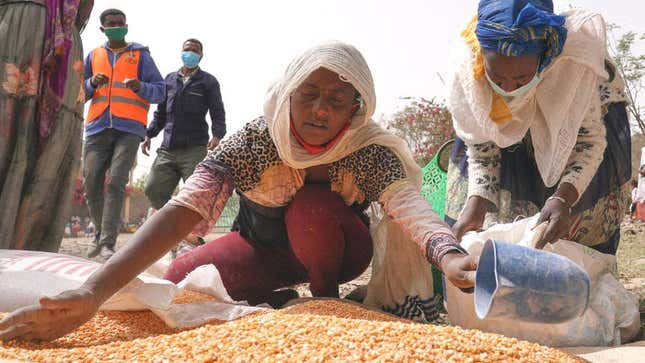
Over the course of the 15-month conflict in the region of Tigray in northern Ethiopia, its residents have been directly effected as violence keeps organizations from bringing supplies and food, reported The Guardian. At the beginning of the war between rebels and government forces, The World Food Programme found 37 percent of the Tigray population had run out of food or gone days without eating, per The Guardian.
About 13 percent of children under five years old as well as pregnant women were facing malnutrition. The Guardian reported researchers were not able to travel to areas that needed aid because fighting was occurring in those same locations. For the past six weeks, Tigray has still not seen any aid.
From The Guardian:
“This bleak assessment reconfirms that what the people of northern Ethiopia need is scaled up humanitarian assistance, and they need it now,” said Michael Dunford, WFP’s regional director for eastern Africa.
“WFP is doing all it can to ensure our convoys with food and medicines make it through the frontlines. But if hostilities persist, we need all the parties to the conflict to agree to a humanitarian pause and formally agreed transport corridors, so that supplies can reach the millions besieged by hunger.”
Across the regions of Tigray, afar and Amhara, nine million people are in need of humanitarian assistance, reported The Guardian. BBC reported doctors are among those in need of food. According to the report, nurses and doctors have not been paid in eight months causing them to continuously line up for food parcels. Additionally, as pregnant and breastfeeding women suffer from hunger, babies also suffer as a consequence. BBC reported an infant was discharged from a hospital but died shortly after going home because of the lack of food.
From The Guardian:
“Before the conflict we were eating three times a day but now even once a day is difficult. I was borrowing food from my family but now they have run out. We just sleep and hope we do not perish,” Kiros, a single mother of six children living on the outskirts of the region’s capital, Mekelle, told researchers.
The lack of access and communication to Tigray has made it difficult for organizations including the United Nations to provide resources. The UN accused the government of preventing both food and supplies from being delivered via a de-facto blockade, per The Guardian. So far, the International Committee of the Red Cross was able to make one delivery of medical supplies since September.
BBC reported the UN requested $337 million to fund an operation to provide aid to northern Ethiopia in the next six months.

